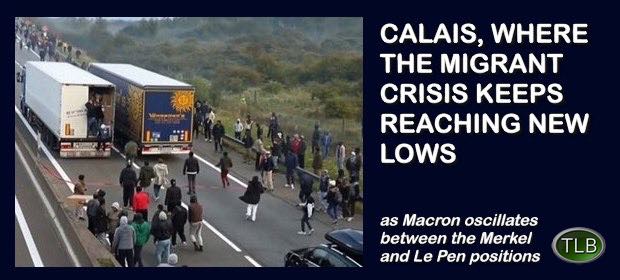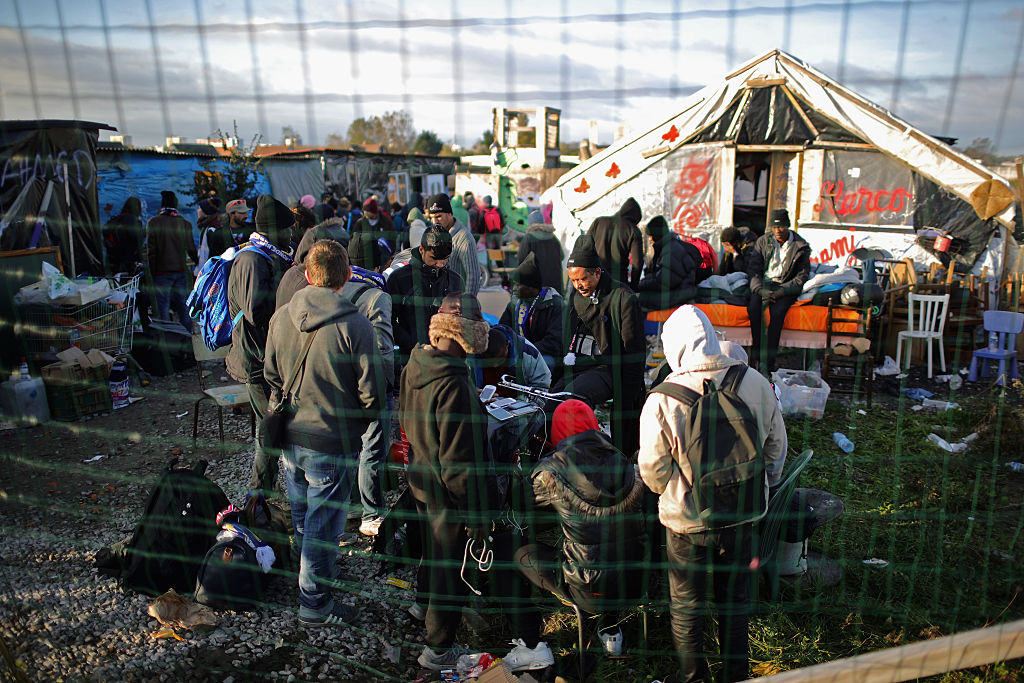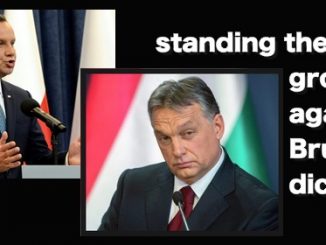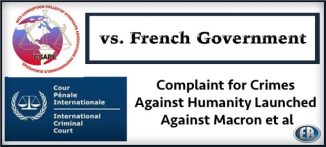
Pam Barker | Director of TLB Europe Reloaded Project
I can highly recommend Kern’s review piece detailing the current and historical problems of the EU migrant crisis centred around Calais in particular and France in general. Calais has long been a stress point for waves of migrants who are set on reaching the UK come hell or high water. Proposed strategies to deal with migrants on the Libyan side or to create other Calais-type reception centres around France have either failed or exacerbated the problems. Our illustrious politicians on both sides of the Channel seem incapable of providing effective solutions despite their various treaties and public statements. And Rothschild-backed Macron’s ‘centrist’ attempts to deal with the problem see him flailing between Merkel-style acceptance of the illegals and Le Pen’s harsher yet voter-friendly promises to crack down on the problem. Politically it might amount to no more than a clever, confused play between old ‘right’ and ‘left’ postures while the actual agenda – satisfying the globalists who want to see us inundated with illegals – remains unchanged.
Interesting tidbits include finding that Afghan, Kurdish and other traffickers are hiding out among the migrants, causing inter-gang violence and violence against the migrants themselves. So, too, are jihadists who use the camps to disappear from the purview of the security services. Amazingly, these camps also seem to be hotbeds (no pun intended) of sexual activity between volunteers and illegals.
********
France: Migrant Crisis Spirals Out of Control
- French Interior Minister Gérard Collomb described the level of violence in Calais as “unprecedented.” He attributed the fighting to an escalating turf war between Afghan and Kurdish gangs seeking to gain control over human trafficking between Calais and Britain, which many migrants view as “El Dorado” because of its massive underground economy.
- During his visit to Calais, Macron outlined his government’s new immigration policy: food and shelter for those entitled to remain in France, and deportation of those in the country illegally.
- “Emmanuel Macron did it. Never before has a president of the Republic fallen into unpopularity so fast and then become popular again.” — Paris Match.
Hundreds of Africans and Asians armed with knives and iron rods fought running street battles in the northern port city of Calais on February 1, less than two weeks after French President Emmanuel Macron visited the area and pledged to crack down on illegal immigration.
The clashes plunged Calais — emblematic of Europe’s failure to control mass migration — into a war zone and reinforced the perception that French authorities have lost control of the country’s security situation.
The mass brawls, fought in at least three different parts of Calais, erupted after a 37-year-old Afghan migrant running a human trafficking operation fired gunshots at a group of Africans who did not have money to pay for his services. Five Africans suffered life-threatening injuries.
Within an hour, hundreds of Eritreans, Ethiopians and Sudanese took to the streets of Calais and attacked any Afghans they could find. More than a thousand police officers using batons and tear gas were deployed to restore order. Two dozen migrants were hospitalized.
French Interior Minister Gérard Collomb described the level of violence in Calais as “unprecedented.” He attributed the fighting to an escalating turf war between Afghan and Kurdish gangs seeking to gain control over human trafficking between Calais and Britain, which many migrants view as “El Dorado” because of its massive underground economy. Each day around 40 ferries depart Calais for Britain.
Vincent de Coninck, director of the charity Secours Catholique du Pas-de-Calais, said that rival gangs were trying to secure control over access to the port of Calais in order to induce payments of €2,500 ($3,100) from migrants seeking to stow away on trucks crossing the English Channel.
De Coninck added that the situation in Calais had deteriorated since January 18, when Macron and British Prime Minister Theresa May signed the so-called Sandhurst Treaty, in which May pledged to speed-up the processing of migrants hoping to travel to Britain from Calais.
According to de Coninck, Macron and May failed adequately to explain the contents of the new treaty. This failure, he said, had created false hopes among migrants from Africa and elsewhere that the treaty would improve their chances of reaching Britain. De Coninck further said that hundreds of new migrants had arrived in Calais during the two weeks since the treaty was signed. The surge of new arrivals, he said, had created an “imbalance” between Africans and Asians — thereby increasing inter-ethnic tensions.
François Guennoc, vice-president of the Calais charity L’Auberge des Migrants, echoed the view that the new treaty had created false expectations. “It gave people hope to reach England,” he said.
“People arrived suddenly, about 200, mainly underage people and women who arrived in Calais because they thought that the Home Office said they could go directly to England. Then they thought the Home Office was lying. People were upset. It was crazy.”
Europe’s migration crisis has emerged as the first major test facing President Macron, who appears to be seeking out a middle-ground compromise position on the issue: he has promised to pursue “humanitarianism” by speeding up the processing of asylum requests while also pledging to pursue “firmness” by deporting those who do not qualify.
During the presidential campaign, Macron, who ran as a centrist, repudiated the anti-immigration positions of his opponent, Marine Le Pen. He campaigned on a platform of open borders and promised to establish France as “the new center for the humanist project.” Since assuming office on May 14, 2017, however, Macron appears to have incorporated many of Le Pen’s ideas.
In an essay published by Le Monde on January 2, 2017, Macron wrote that German Chancellor Angela Merkel’s decision to allow in more than a million migrants from Africa, Asia and the Middle East had “saved the collective dignity” of the European people. He added that he would not tolerate the “rebuilding of walls in Europe” and criticized the “abject simplifications” made by those who say that “by opening the borders to migrants, the chancellor exposed Europe to severe dangers.”
On July 27, 2017, however, after less than three months in office, Macron warned that 800,000 migrants in Libya were on their way to Europe. He announced a plan to establish immigration centers in Libya to vet asylum seekers there. He said his plan would stem the flow of migrants to Europe by discouraging economic migrants from embarking on the Mediterranean crossing to Europe. “The idea is to create hotspots to avoid people taking crazy risks when they’re not all eligible for asylum,” Macron said. “We’ll go to them.”
In that same speech, though, Macron appeared to encourage migrants to make their way to France. He pledged housing for all newcomers “everywhere in France” and “from the first minute.” He added: “By the end of this year, I do not want to have any men and women living on the streets, in the woods. I want emergency accommodations everywhere.”
On August 8, 2017, the French Interior Ministry reported that more than 17,000 migrants attempted to board UK-bound trucks and trains at the port and Eurotunnel in Calais during the first seven months of 2017. The figures showed that the closure of “The Jungle” in October 2016 had failed to deter migrants in Calais from reaching Britain.
 Pictured: Migrants at “The Jungle” migrant camp in Calais, France on October 28, 2016, shortly before the camp was closed by French authorities. (Photo by Christopher Furlong/Getty Images) Pictured: Migrants at “The Jungle” migrant camp in Calais, France on October 28, 2016, shortly before the camp was closed by French authorities. (Photo by Christopher Furlong/Getty Images) |
In September 2017, the French government asked the European Union for permission to maintain border controls within the passport-free Schengen zone for as long as four years due to the continuing threat of Islamic terrorism, according to a classified document leaked to The Guardian. On October 3, France extended border controls for another six-month period, to April 30, 2018.
On October 15, two weeks after a Tunisian migrant stabbed to death two women in Marseille, Macron pledged to deport any migrant who commits a crime. “We will take the most severe measures, we will do what we must do,” Macron said. “We are not taking all the steps that should be taken. Well, that is going to change.” Analysts said that nuances in French law would make the pledge impossible to implement.
On November 20, in a circular leaked to the press, Interior Minister Gerard Collomb ordered prefects, representatives of the state in each of the 96 departments in mainland France, to deport all failed asylum seekers. He also ordered them to submit a report, by the end of February 2018, that would provide
“details about the fight against irregular immigration in your department in 2017, and your plan for the implementation of these instructions in the coming months. (…) The fight against irregular immigration is the responsibility of each prefect of each department. It is necessary to act quickly.”
The leak of the so-called Collomb Circular marked the beginning of an organized resistance movement among French political and media elites to Macron’s migration policies. In an open letter published by Le Monde, for instance, a group of intellectuals and trade unionists, many of whom had supported Macron during the presidential campaign, criticized his migration policy: “Mr. Macron, your policy contradicts the humanism you advocate!”
On December 4, in an interview with RTL, Interior Minister Collomb said the government was working on a reform of migration policy. “There are 95,000 asylum applications a year, that is, a big city every year. If we welcomed everyone, we could not do it in good conditions. We have decided to welcome those who are refugees from theaters of war, who are political prisoners, but at the same time to try to pursue a policy that allows economic migration to be carried out in other ways.”
On December 12, Interior Minister Collomb ordered regional authorities to establish “mobile teams” to force undocumented migrants out of emergency shelters. The measure produced a strong backlash from charities, which said the shelters are sacrosanct.
On January 9, 2018, the French Office for the Protection of Refugees and Stateless Persons reported that in 2017, more than 100,000 people had requested asylum in France, a “historic” number and an increase of 17% compared to 2016.
On January 14, Interior Minister Collomb announced a plan to establish 400 detention centers to deport economic migrants in the country illegally. “Refugees are welcome, economic migrants are not,” he said.
On January 16, during his visit to Calais, Macron outlined his government’s new immigration policy: food and shelter for those entitled to remain in France, and deportation of those in the country illegally.
On January 18, Macron traveled to Britain, where signed the Sandhurst Treaty, which reduces the processing time for migrants hoping to travel to Britain from Calais from six months to one month for adults, and 25 days for children. The new treaty, far from solving the migrant crisis, appears to be exacerbating it.
In an analysis published by Paris Match, pollsters Chloé Morin and Marie Gariazzo said that conflicting voter reactions to the “Macron method” of compromise on migration policy “reflects the contradictions of his electorate”:
“Quantitative studies indicate, a priori, that a clear majority of French voters support a more restrictive migration policy…. The heart of the government’s policy…guarantees the inviolability of the right to asylum while challenging the country’s ability to welcome all the world’s misery….
“It is not certain that the Macronian gamble — finding a balance between firmness and humanity — is a long-term winner. Emmanuel Macron appears at this stage to be supported by his base. But we find among them an expectation of firmness (‘we must not be overwhelmed,’ ‘laxity would have negative consequences for our country’) as well as one of humanity (‘we must help those fleeing wars and persecutions,’ ‘It is morally indisputable to welcome foreigners in emergency, distress’) ….
“This discourse is thus systematically caught between those on the one hand who — often on the right, but sometimes even in the heart of the Macronian base — judge his policy as too ‘lax,’ and on the other hand, those who are indignant over its firmness ….
“It is very likely that a large part of those at the center of the political spectrum, particularly in the center-left, will accept the government’s narrative and subscribe little-by-little to the logic of ‘selective immigration.’ Thus, the official discourse could contribute in the long term to a shift of the ‘moderate’ population on the subject of migration from one of humanity towards one of firmness.”
Macron’s popularity ratings have experienced an “unprecedented” rebound since he pursued a harder line on immigration, according to the French pollsters Ifop. His job approval rating jumped by 10 percentage points since October to 52%. Previously, Macron’s popularity rating registered the biggest decline for a new president since 1995.
“Emmanuel Macron did it,” Paris Match reported. “Never before has a president of the Republic fallen into unpopularity so fast and then become popular again.
Appendix: A Brief History of the Migrant Crisis in Calais
Migrants from across the developing world view Britain as “El Dorado” because of its massive underground economy, which totaled approximately £223 billion (€250 billion; $311 billion) in 2016, or 11.5% of GDP, according to the International Monetary Fund.
In addition, the Identity Documents Act 2010, which entered into effect January 2011, abolished national identity cards. The change, driven by civil liberties concerns over unnecessary data collection and intrusion by the state, allows illegal migrants in Britain to remain inconspicuous.
Moreover, unlike France, migrants from war-torn countries who reach Britain can easily apply for refugee status, which provides them with permission to reside in the United Kingdom for an initial period of five years — with the right to work and access welfare benefits. Lawful residence in the UK for a continuous period of five years qualifies an individual to apply for British citizenship.
This combination of factors has turned Britain into a magnet for migrants. More than 865,000 non-EU migrants were granted permission to live in Britain in 2016 — a rate of one every 36 seconds, according to Eurostat.
Migrants have been gathering in Calais, France’s closest point to Britain, in large numbers ever since the Channel Tunnel linking France and Britain opened in May 1994, and the Schengen Agreement, which abolished border controls between France and most of its EU neighbors (but not the UK), entered into force in March 1995.
In 1999, the French government asked the Red Cross to build a migrant “reception center” in Sangatte, situated around ten kilometers west of Calais, to accommodate a growing number of migrants on the streets of Calais and surrounding areas. The Sangatte camp, which was housed in a giant warehouse near the entrance to the Channel Tunnel, had a capacity for 600 people.
Far from resolving the migrant problem in Calais, the Sangatte facility served as a magnet, quickly drawing thousands more people to the area. Within months, some 2,000 migrants were living in the camp in increasingly cramped conditions. Many of those staying at Sangatte tried to jump onto slow-moving trains at the entrance to the Channel Tunnel, or hide inside trucks crossing to Britain on ferries.
At the time, French authorities reported a massive increase in the number of arrests in or around the Channel Tunnel. In 1999, 8,000 people were arrested in Calais for immigration offenses. By 2001, that number had jumped ten-fold to 80,000 arrests. Eurotunnel, the company that manages and operates the Channel Tunnel, said that in 2001 alone, 54,000 people had “attacked” the terminal in Calais and 5,000 had gotten through. Many of those were living in Sangatte.
The Sangatte camp was closed in late 2002, after a series of riots between Afghan and Kurdish migrants. In all, some 67,000 migrants stayed at the facility during its three years in operation.
In February 2003, France and Britain signed the Treaty of Le Touquet, which allows for so-called juxtaposed controls, meaning that travelers between the two countries now clear immigration in the country of departure rather than upon arrival. In effect, the treaty pushed parts of the British border to France. By doing so, it exacerbated the migration bottleneck in Calais.
CONTINUE READING HERE
ER recommends other articles by The Gatestone Institute
Soeren Kern is a Senior Fellow at the New York-based Gatestone Institute. Follow him on Twitter and Facebook




